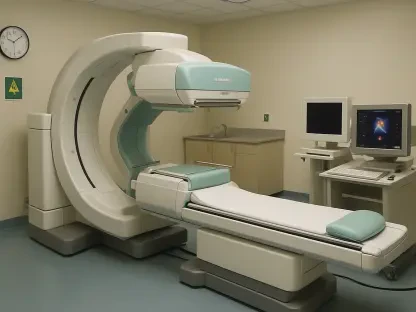The landscape of wearable health technology has evolved significantly since the launch of the first Fitbit in 2007. Initially, these devices were simple tools for tracking steps and calories, requiring manual syncing with a computer to view data. Today, wearable health tech offers advanced, real-time health monitoring capabilities that blend seamlessly into daily life. As these devices have become more sophisticated, they hold the potential to significantly transform healthcare monitoring, offering new ways to track numerous health metrics and potentially improving health outcomes for users globally.
The Evolution of Wearable Health Technology
Wearable health technology has come a long way from its humble beginnings. The first Fitbit, introduced in 2007, marked the start of a new era in personal health tracking. These early devices were limited in functionality, focusing primarily on counting steps and estimating calorie burn. Users had to sync their devices with a computer to access their data, making the process somewhat cumbersome. Despite their limitations, these early wearables paved the way for more advanced health tracking tools.
Fast forward to today, and wearable health tech has undergone a dramatic transformation. Modern devices offer a wide range of health metrics, from heart rate and sleep patterns to stress levels and oxygen saturation. These advancements have made wearables an integral part of many people’s daily lives, providing valuable insights into their overall health and well-being. The ability to monitor various health metrics in real time and receive immediate feedback has made these devices indispensable for those looking to maintain and improve their health.
The evolution of wearable health tech has also been driven by the integration of more sophisticated sensors and smarter algorithms, enabling more accurate and comprehensive data collection. Wearables are now capable of not only tracking physical activity but also detecting irregular heartbeats, monitoring blood oxygen levels, and even predicting menstrual cycles. This shift from basic fitness tracking to comprehensive health monitoring reflects the growing demand for more personalized and actionable health insights.
The Rise of Smart Rings and Advanced Wearables
In the second decade of wearable health tech, the focus has shifted from simply deploying devices to tracking a vast array of health metrics. Smart rings, for example, have emerged as powerful yet unobtrusive alternatives to traditional smartwatches. These devices offer extended battery life and provide users with detailed information about their sleep, activity, and stress levels. The discrete nature of smart rings allows users to wear them comfortably throughout the day and night, ensuring continuous health monitoring.
Major tech companies, such as Samsung, are leading the charge in creating holistic health monitoring systems. Their vision includes not only measuring current health metrics but also providing personalized health insights and coaching. Additionally, they aim to connect users with healthcare providers and caregivers, although this aspect remains an area for future development. Samsung’s approach highlights the potential for wearable tech to not only collect health data but also to support users in making informed decisions about their health.
The rise of smart rings and advanced wearables represents a significant advancement in the field of health technology. These devices are designed to be more user-friendly and provide more meaningful insights than their predecessors. By leveraging the latest advancements in sensor technology, smart rings can offer detailed information about a user’s physiological state, helping them to understand their health patterns and make proactive choices. As these devices continue to evolve, they are expected to play an increasingly important role in preventive healthcare, reducing the need for reactive medical interventions.
Integrating Wearable Tech with Healthcare Services
Brands like Withings and Oura are at the forefront of integrating wearable tech with healthcare services. Withings’ Cardio Check-Up feature, for instance, allows data from smart devices to be evaluated by cardiologists, providing users with detailed feedback within 24 hours. This partnership with Heartbeat Health Partners exemplifies the potential for technology to facilitate early diagnosis and personalized healthcare. By enabling healthcare providers to access real-time health data from wearables, these collaborations can lead to more timely and accurate diagnoses.
Oura’s collaboration with Essence Healthcare is another pioneering example. By providing Medicare Advantage members with complimentary smart rings and apps for health monitoring, Oura supports members and represents a shift towards value-based care. This approach focuses on long-term patient outcomes rather than traditional fee-for-service models, enabling healthcare providers to offer more informed and personalized care. The integration of wearable tech with healthcare services has the potential to improve patient outcomes and reduce overall healthcare costs.
The future of wearable health technology, as predicted, lies in these kinds of partnerships. The detailed insights and health monitoring facilitated by wearables help healthcare providers compare individual data over time, potentially spotting irregularities that might be missed using national averages. This approach is seen as a strong possibility for the future of healthcare. Oura is expected to expand similar partnerships across other health categories, such as metabolic, cardiovascular, and women’s health, further demonstrating the potential for wearable tech to revolutionize healthcare.
Real-World Impact and Future Potential
The real-world impact of wearables is evident through anecdotal evidence from users who have been prompted by their devices to seek medical evaluations. These personal accounts highlight the potential of wearables to aid in early diagnosis and ongoing health management. The collaboration between AI-embedded wearables and medical professionals is seen as a complementary relationship rather than a replacement for human doctors. The combination of continuous data collection and professional medical evaluation provides a comprehensive approach to healthcare.
Apple’s advancements, such as the AirPods Pro 2 and Apple Watch Series 10, further illustrate the integration of wearable tech into personal health monitoring. These devices feature health diagnostics like hearing tests and sleep apnea detection, showcasing how wearable tech is becoming more deeply embedded in everyday life. As these technologies continue to evolve, the potential for wearables to provide even more detailed and accurate health insights will likely increase, making them an essential component of personal health management.
The ongoing advancements in wearable health technology also raise important questions about the future of healthcare. As devices become more sophisticated and capable of collecting a wider range of health data, the potential for wearable tech to become a standard tool in medical practice grows. By providing continuous and comprehensive health monitoring, wearables can play a key role in preventive healthcare, reducing the burden on healthcare systems and improving patient outcomes.
Addressing Concerns and Market Growth
The wearable health technology landscape has seen remarkable advancements since the debut of the first Fitbit in 2007. Originally, these gadgets were basic, tracking only steps and calories, and required users to manually sync them with a computer to review their data. Fast forward to today, and wearable health tech has transformed drastically. Modern devices now provide advanced, real-time health monitoring features that integrate effortlessly into everyday routines. These sophisticated wearables can track a plethora of health metrics, from heart rate and sleep patterns to oxygen levels and stress. With these innovations, they hold great potential to revolutionize healthcare monitoring and management.
These devices go beyond fitness, offering users insights into their overall health, potentially leading to better health outcomes. For instance, wearables can alert users to irregular heart rhythms, prompting early medical intervention. They can also guide users in managing chronic conditions by providing continuous data that can be shared with healthcare providers. This evolution signifies a shift towards more proactive and personalized health management, aiming for preventative care rather than reactive treatment. As wearable technology continues to advance, it promises to reshape the way we approach health and wellness on a global scale, making it a staple in modern healthcare.









